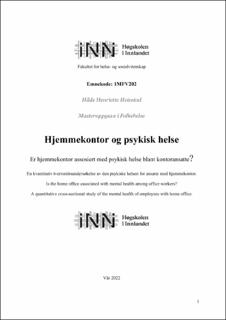| dc.contributor.advisor | | |
| dc.contributor.author | Hilde Henriette Heiestad | |
| dc.date.accessioned | 2022-12-22T17:10:12Z | |
| dc.date.available | 2022-12-22T17:10:12Z | |
| dc.date.issued | 2022 | |
| dc.identifier | no.inn:inspera:125638705:69316394 | |
| dc.identifier.uri | https://hdl.handle.net/11250/3039294 | |
| dc.description.abstract | Bakgrunn: Offentlig statistikk viser at under koronapandemien jobbet mellom 1,4 og 1,7 millioner nordmenn hjemmefra. AFI rapporten viser at en stor andel fortsatt vil jobbe fra hjemmekontor. STAMI har i sin kunnskapsoppsummering gitt uttrykk for at det foreligger et sterkt behov for mer kunnskap om forhold som bidrar til at arbeid hjemmefra er gunstig eller kan ha negative effekter.
Mål: Prosjektet har hatt som mål å finne om det finnes en sammenheng mellom hjemmekontor og psykisk helse blant kontoransatte. Oppgavens mål var dels å se om det finnes en sammenheng mellom psykisk helse og hjemmekontor, og dels å se om det var bedre eller dårligere psykisk helse ved å jobbe på hjemmekontor.
Metode: Masteroppgaven er av kvantitativ art og er en tversnittstudie. Data ble innhentet gjennom en anonym spørreundersøkelse som er basert på QPSNordic34+. Det var totalt 310 kontoransatte ved 69 bedrifter som er med i utvalget. Både offentlig og privat sektor er med på undersøkelsen. For å finne svar på oppgaven ble det brukt forskjellige statistiske metoder, som binær logisk regresjonsanalyse, frekvensanalyse og krysstabeller i SPSS. Reliabilitet ble testet ved blant annet Pearson Chi-Square og Nagelkerke R-Square test.
Resultat: Her var det hele 83,2 % som vurderte at de fikk bedre psykisk helse ved å arbeide på hjemmekontor eller hybrid. Regresjonsanalysen viste at det var 8 statistiske signifikante sammenhenger. I analysen av sammenhengen mellom psykisk helse og hjemmekontor fant vi at arbeidsmiljøfaktorer som kollegastøtte, vanskelige arbeidsoppgaver, utvikling av ferdigheter og rolleavklaring var av betydning. I analysen av om hjemmekontor var bedre for den psykiske helsen fant vi at arbeidsmiljøfaktorene kommunikasjon og ferdighetsutvikling var av betydning. Her fant vi at dess bedre kommunikasjonen var med arbeidsgruppen, dess bedre hadde den ansatte det psykisk på hjemmekontor, og dess bedre nærmeste sjef var til å utvikle ens ferdigheter, dess dårligere var det for den psykiske helsen å jobbe på hjemmekontor.
Konklusjon og implikasjoner: Oppgaven konkluderer med at det foreligger en assosiasjon mellom psykisk helse og hjemmekontor. Selv om denne er svak, er det viktig å forske videre på dette sammen med andre faktorer som kan bidra til å øke forklaringsgraden. Det er viktig å kartlegge arbeidsmiljøfaktorer i forhold til krav/kontroll, sosial støtte og sosioøkonomisk status. | |
| dc.description.abstract | Background: Public statistics show that between 1.4 and 1.7 million Norwegians worked from home during the Corona pandemic. The AFI report shows that a large proportion will continue to work from home in the future. In its report, STAMI has expressed that there is a need for more knowledge about factors that contribute to that working from home is beneficial or can have negative effects.
Objective: The objective of the project was to investigate whether there is a connection between working from home and mental health among office workers. The objective of this report is partly to investigate if there is a connection between mental health and home office, and partly to investigate whether there is a connection between working from home and better/worse mental health.
Method: This master thesis is of a quantitative nature and is a cross-sectional study. The data was obtained through an anonymous survey, based on QPSNordics34+. 310 office employees across 69 companies included in the selection. Both the public and private sectors are involved in the study. Different statistical methods were used, such as binary logical regression analysis, frequency analysis and cross tables in SPSS. Reliability was tested by the Pearson Chi-Square and Nagelkerke R-Square test.
Result: 83.2% responded that they considered their mental health improved when working from home or working hybrid. We found 8 statistically significant variables. The analysis of the relationship between mental health and working from home, found that work environment factors such as colleague support, difficult tasks, development of skills and role clarifications were significant. The analysis of whether working from home was better or worse for their mental health, was found that with improved communication within the department, the mental health was improved when working from home, and the better the manager was at developing one’s skill, the worse the mental health was when working from home.
Conclusion and implications: This thesis conclude that there is an association between mental health and working from home. Although this is weak, it is important to carry out further research on this in combination with other factors that may contribute to increase the degree of explanation. It is important to map out working environment factors in relation to demand/control, social support and socio-economic status. | |
| dc.language | nob | |
| dc.publisher | Inland Norway University | |
| dc.title | Hjemmekontor og psykisk helse. | |
| dc.type | Master thesis | |
